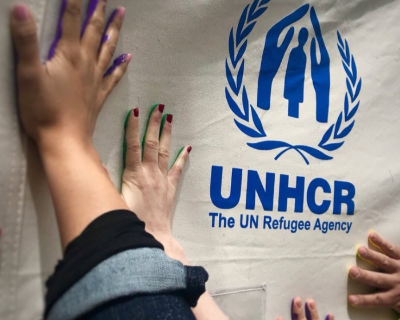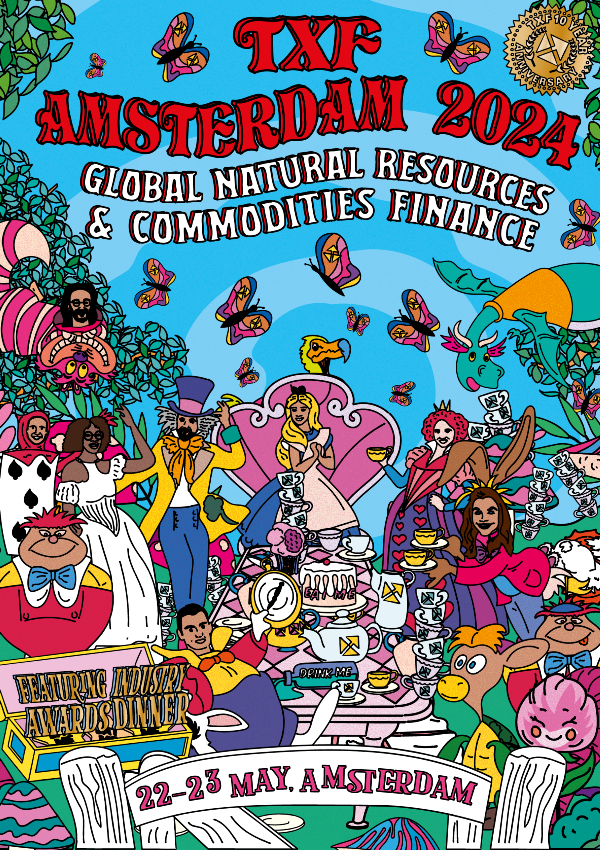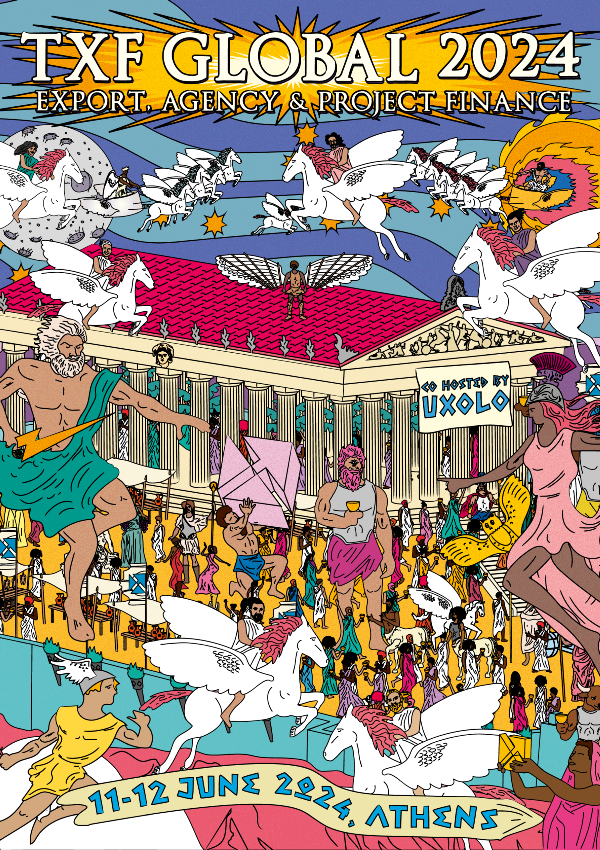Finance meets philanthropy: An in-depth look at the work of the UN Refugee Agency
The Commodity Finance industry raised an impressive €26,500 for UNHCR - the UN's Refugee Agency - during the industry dinner at TXF Amsterdam on May 17. In an interview with TXF, UNHCR spokesperson Laura Padoan tells us about the critical work of the agency in supporting refugees and displaced people across the world.

TXF: Laura, can you tell us what you do for a job?

Laura Padoan (LP): Yes, my job is as a spokesperson for UNHCR, the UN Refugee Agency. What I aim to do is to tell the stories of refugees, give them a voice in the media and to have refugee issues reflected in politics as well. This helps support our international operations and helps create an environment in the UK that is more friendly and welcoming towards asylum seekers and refugees.
TXF: Can you give us an update on some of the main issues you´re working on at the moment?
LP: One of the biggest crises we´re facing at the moment is the Syria conflict, now in its seventh year. There are more than five million Syrian refugees who have been displaced, outside of their country, and half of the population of Syria has been forced from their homes.
The bombings are ongoing, there are still a large number of towns and cities across the country that are under siege, and it´s very difficult to get aid and medical supplies in. And really, those are the reasons why people are fleeing. Because if it was at all safer, then they wouldn´t leave the country that they love, the jobs that they can earn a living from, and their home, because it´s a great sacrifice to leave your home.
The more time I spend with refugees, the more I realise how important it is to have a national identity and to lose that and to lose the protection of your government, can deeply affect someone. So even after as much as ten or twenty years of being in exile, it´s still very difficult for many refugees to leave that sense of home behind.
It is very important for other countries to provide spaces for asylum, but actually, all of the refugees I’ve ever met, the one place they´ve said they´ve wanted to go is back home. Unfortunately, in most countries, it´s not safe.
We are in a period now, where people are spending more time in exile and there are more refugees than at any other time. We have many refugees in protracted situations like Somalis who have been living in exile in Kenya, Afghans in Iran or Pakistan, and we´re seeing now the second or third generations of people who have been born in a refugee camp. If they can´t access citizenship in those countries, then they can’t access many of the rights that go along with it. Which can mean that your children can´t go to school, you can´t legally have a job, you can´t have the protection of a state and you can´t travel. So, to have lives that are left in limbo for so long is the reason why it´s very important that in the UK, we offer some channels out of those situations.
It´s also a reason why people are making an onward journey now from refugee camps. In 2015 we saw the phenomenon of large numbers of people who had been living in exile in places like Turkey and Jordan and Lebanon who decided to make the dangerous journey across the Mediterranean Sea to reach safety in Europe. That is because the conditions in their first country of asylum, had become so dire that it wasn´t sustainable to keep living there.
I remember one Afghan man I met when I was working in Lesvos. He was 25. The conflict in Afghanistan had forced his parents into Iran and it was when his son was born in the same refugee camp that he was born in, that he decided that he couldn´t have his child have the same life that he had. That´s why he and his wife took their six-week-old baby on a dinghy and braved the waters to cross into Greece - because he didn´t want that kind of life for the next generation.
TXF: You mention an average of 17 years as a refugee and that´s an incredibly long time. Is that driven purely by the length of conflict in different countries?
LP: It´s driven partly by the lengths of the conflicts. But also because of the lack of a durable solution in first countries of asylum. Still 84% of the world’s refugees are living in developing countries, where sometimes it is the poorest people who have opened their homes and said, we understand what you´ve been through, and we are making you welcome here.
TXF: You mentioned the huge impact of the conflict in Syria. Perhaps you can talk about some of the lesser known troubles you are currently seeing, and the impact they are having.
LP: Yes certainly, an example would be the world´s newest country: South Sudan. It was created with a great deal of hope because the South Sudanese people had experienced war for so many years that when they gained independence, it was felt that a new chapter was beginning. But, sadly, what we´ve seen now is a brutal and bloody civil war which has forced more than a million refugees into Uganda.
In the North East of Nigeria, persecution by the Islamist group Boko Haram has forced people to flee into neighbouring Niger, which is, in itself, in the grip of immense food insecurity.
Another area that perhaps doesn´t get much attention is Central America, which is in the grip of terror from street gangs that have control of large swathes of the country in Guatemala, Honduras and El Salvador. I was in Mexico last year meeting refugees, and people are absolutely terrified. Their children are recruited into gangs. If they refuse, then they´re shot, or tortured or kidnapped. Young girls are taken as gang girlfriends and if they refuse, they´re raped. Whole families are persecuted.
El Salvador has the highest murder rate of anywhere in the world. Often, we´re hearing about Mexico as a source country for immigration, but actually, they´re providing for thousands of refugees from across the region.
There are a great many number of conflicts all around the world. We´re facing the biggest displacement crisis that the world has faced since the Second World War and how we respond will come to define us as a generation. I think it is really important that we do respond with humanitarian values, rather than closing borders and closing options to people who do really need a place of sanctuary.
TXF: For you, personally, what is the biggest challenge you currently face?
LP: I think there are two challenges. One is that as a UN agency, similar to UNICEF, we rely on the generosity of the public and donations to help us to be able to respond in times of crisis and emergencies. We appreciate that it is a very difficult economic environment and there are many competing priorities.
We hear so much about the war in Syria, and we have done for so long, that people do become tired of hearing these stories. When, sadly, there was the tragedy of the Syrian toddler, Alan Kurdi, whose body was found on a beach in Turkey, that did mark a huge outpouring of empathy and compassion from people.
It´s very important that we maintain that level of compassion from the general public, because we can talk every day about shipwrecks and every single week, I hear from my colleagues in Greece and in Italy about adults and children who have lost their lives. But we don´t see it in the papers every week, the bodies of those children. And perhaps it´s not right that we should. But, it´s very difficult to maintain the public’s interest and compassion for these issues.
The second point is that politically, we’re facing uncertain times in many countries, with polarised movements across Europe and the United States. Britain has always had a long and proud tradition of providing sanctuary for people who are in need and who are fleeing war and persecution and it´s hoped that those kinds of British values are maintained as we respond to these new challenges.
TXF: What more can we do as individuals? And, what more can companies do to help refugees and to try to play a part in resolving such situations?
LP: There are lots of ways that people can support, in addition to donating. I´ve been amazed by the amount of people who´ve expressed interest in providing foster care places for unaccompanied children who are arriving in the UK. People can also offer their spare rooms to asylum seekers who would otherwise be destitute.
Many local groups and churches do toy collections for refugee children. Items like buggies are always really welcomed.
People can also encourage their local authorities to sign up to the Home Office’s resettlement scheme for vulnerable Syrians, or groups of individuals can resettle refugees through community sponsorship.
TXF: And on a company level?
LP: One of the things that refugees always tell me is that they want to give something back to the country that´s welcomed them in. They want to re-train and they want to contribute their skills through work.
Companies like IKEA have been great at working with UNHCR to provide solutions to more sustainable housing in refugee camps. They´re also employing refugees to make rugs, for example, and then selling those. And Starbucks also has a programme to recruit refugee baristas.
Aside from offering work experience, companies can also explore how their expertise and their staff can support refugees is. A number of companies in the tech sector are offering coding courses for free to refugees. There is a bakery in East London that´s employing refugee women to make bread for them. Private schools are offering scholarships for refugee children. And we’ve seen universities across the country waiving tuition fees for refugee scholars.
Whatever the skills and capabilities that companies can provide, I’m sure that there are creative ways that these can be put to use - even if it is just raising awareness.
TXF: You have spoken at length at the many serious challenges refugees face, and the very the unprecedented situation society is up against. Do you see any chinks of light, anything that gives you hope?
LP: There are always chinks of light. I´ve worked with refugees across Africa and the Middle East, I´ve seen refugees on their journeys through Europe and seen the hardships that they´ve endured. I know that no parent puts their child through those kinds of dangers unless what they´re fleeing is far more dangerous. So, when families do find safety in the UK or elsewhere, and they can start to re-build their lives, that is really an achievement. When they see their children in schools in England, that is such a positive hope for the future.
It can be very difficult for adults to put behind them the trauma of war or persecution, and of having lost some of their loved ones. But children are resilient and can often learn new languages quickly. Despite having been out of education for a long time, in subjects like maths, where language isn´t as important, they´re doing brilliantly at school.
I visited a family in Tunbridge Wells recently. They had lost their father in the conflict in Aleppo, he was killed by a bomb, and they fled to Beirut. All three children, the youngest of whom was eleven at the time, had to give up school and they had to work to support their disabled mother. They were working full time in factories, in supermarkets and in shops, just to be able to meet the rent. There were five families who were living in a five-bedroom house and all of them were sharing one kitchen and one bathroom. For that mother to have seen her children out of school and having to go to work must just have been heart-breaking.
But now, all of those children are in school in Tunbridge Wells and they´re just so eager to learn, and to re-build their lives. So I think that there is always hope, because, you know, even if it is just a couple of refugee families per local authority, that makes a massive difference to those families who do have a second chance to put the past behind them and start again. It´s not an easy process at all, but I think that is definitely hopeful.
I met another family who had been re-settled from Turkey to Northern Ireland. Their four-year-old daughter had been injured in a bomb blast and she’d suffered third degree burns to her body. So, in Turkey, the family scraped together the money that they needed for an operation, but it was such a botched job that the daughter was left in constant pain and unable to walk.
When she arrived in Belfast, she was able to go to hospital and to have the expert care that the NHS can provide. For the first time in years - and she´s only 5 - she´s able to walk without difficulty, she´s going to a normal school and she feels like a normal child again.
The idea that local communities can give back a childhood to even one girl is an astonishingly generous act. And that´s only come about because people have said, ´yes, we have got room in our community, and we will tell our local politicians that refugees are welcome where we live´.
TXF: You have spoken of some of the refugee families that have been able to settle in Europe and the US, and you have spoken of the current political and social environment that we are seeing. Are the refugees that you speak to aware of this climate, and what do they think of it?
LP: Of the refugees I´ve met in the UK, I´m very, very happy to say that they´ve felt very warmly welcomed by their communities and they haven´t experienced any kind of harassment or racism, which I'm so encouraged by.
One family in Coventry were resettled to a council estate. When the neighbours found out there would be a baby in the family, they all rallied together and actually, when the family arrived, there were three prams waiting for them! They only needed one, but that´s the warm response that people have received. So, I am constantly optimistic that people, when they understand what refugees have been through, will act with compassion in their hearts and not close their doors to them.
TXF: Finally, what is your proudest moment?
LP: One of my proudest moments was when I was working at the height of the famine that was gripping the Horn of Africa in the summer of 2011. I was on emergency mission in the Somali region of Ethiopia in a place called Dollo Ado and I was at the border and a twelve-year-old boy staggered across to us. He was completely on his own. When I spoke to him through an interpreter he said that his parents had fled five years before because his father had been threatened by Al Shabaab that they would kill him.
His parents had fled with his siblings, but he as the oldest boy, had been left to look after his grandmother who was too old and frail to make the journey and to look after the family’s remaining livestock. The parents never knew how long they would be. They thought it would be a few weeks and then they would be able to go back to fetch him. But five years later he hadn´t seen them. It was after his grandmother had died, and the very last of his goats had died because of the drought that had swept Somalia at that time, that he made his way with a group of other refugees, across the border into Ethiopia. He arrived with absolutely nothing.
We managed to locate his family who were living in the refugee camp where I was working. They had only arrived a month previously. They´d travelled across Somalia and Ethiopia, and they had eventually arrived in the camp. I was there to be able to reunite the boy with his family and to see the mother’s joy and tears and relief on her face, and the sense of belonging that this child felt was a very special moment. I felt very privileged to be part of that. I feel quite emotional talking about it. The family had very little. They were just surviving on the small rations that the UN provided for them. But, they made a welcome home meal for him, and invited me to join in with them. So, I think that, for me personally… was one of my proudest moments.
Every refugee has a story - If you would like to get involved with the work of UNHCR or power it by donating, please click here.





